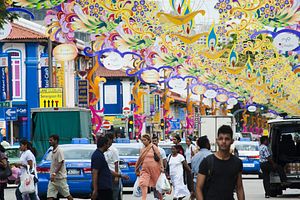A lot has been written and said about the Indian diaspora in the past few days, especially in the context of Prime Minister Narendra Modi’s U.S. visit, and the rousing reception he received from the diaspora settled there – the Madison Square Garden event being a clear testament to that. Modi did not disappoint, easing visa regulations and merging the Person of Indian Origin (PIO) and Overseas Citizenship of India (OCI) Cards.
In recent years, the government of India, along with a number of state governments, has been making efforts to reach out to the Indian diaspora. While the government began to host the Pravasi Bharatiya Divas (Non-resident Indian Day), state governments too have been hosting summits with the aim of not just attracting investment from Indian’s abroad, but also to help strengthen linkages with their native regions.
While India started a Ministry of Overseas Indian Affairs, state governments with a substantial diaspora have also set up separate departments to look into some of the demands and concerns of non-resident Indian’s (NRI’s). The state governments have acted in different ways, because their engagement with the diaspora varies. Indian cities such as Hyderabad, Chennai, Ahmedabad and Mumbai benefited from remittances and FDI from a large number of their people present in the U.S., U.K., Canada, the Gulf region and Southeast Asia. Hyderabad benefited substantially in the IT and IT enabled services (ITES) sectors, in particular with companies like Microsoft, which set up a second development center in the city, the other being located at company headquarters in Redmond, Washington. Other firms such as Facebook have also headquartered their Indian operations in Hyderabad, along with many other large tech firms as well as small and medium enterprises.
This is largely due to the Telugu diaspora present in Silicon Valley, and other major hubs around the world. The same applies to Chennai and Bangalore, which are major tech hubs in India, with Chennai also being a manufacturing hub specializing in the automobile industry, again largely due to its diaspora in Southeast Asia and other places with a shared cultural heritage. Similarly, the Punjabi diaspora sends a sizeable volume of remittances, with a number of individuals also involved in philanthropic activities. Remittances in India reached $70 billion in 2013 according to World Bank estimates, which accounts for over 4 percent of the country’s GDP.
The bond between India and its diaspora has been considerably strengthened over the past decade. It is not just the contribution of the diaspora through FDI, remittances and the transfer of knowledge and entrepreneurial means. It is also the positive contribution the diaspora has played in contributing to the rise of the services sector in India, especially in the IT and ITES sectors. Most importantly, the Indian diaspora is also active in local politics in countries like the U.K. and Canada, while the Indian lobby has begun to assert itself in cases such as the Indo-U.S. nuclear deal.
Even though there has been positive change, a number of problems persist. First, there is often a perception that the Indian government gives greater importance to the more affluent sections of the diaspora, consisting of businessmen and those with white collar jobs.
The second problem with India’s diaspora policy is that while NRIs are given attention, individuals who migrated from India generations ago, known as persons of Indian origin, or PIOs, and who are often keen to establish links, are not given much attention. For example, PIOs in Myanmar from states such as Bihar, Tamil Nadu and Punjab. A number of these PIOs are stateless and are keen to connect with their roots. India could make a strong beginning by either considering granting these PIOs citizenship, or any other right that makes them socially and politically involved with their country of origin.
Countries such as Kenya and Fiji also have sizable Indian populations that can add to India’s diversity. Kenya has many people who migrated mainly from the western Indian state of Gujarat, who specialize in trade and contribute to Indian growth. Fiji on the other hand has a sizable PIO population who are politically powerful, which contributed to a coup in 2000 in which the first Indo-Fijian Prime Minister Mahendra Chaudhry was overthrown. With such a pool of emigrants, India could tap its diaspora for better relations with these countries.
A strong relationship with its population abroad is important for India. Remittances and investment should only be one element of that relationship. It is also the duty of the government to ensure that the demands of sections of the diaspora who lack political and economic clout are also given attention, and that they do not feel neglected.
Tridivesh Singh Maini is a Senior Research Associate with the Jindal School of International Affairs, Sonepat. He was a Public Policy Scholar at The Hindu Centre for Politics and Public Policy from November 2013 to March 2014. Sridhar Ramaswamy is a Master’s student of Indian Foreign Policy at the Jindal School of Ineternational Affairs, Sonepat.

































